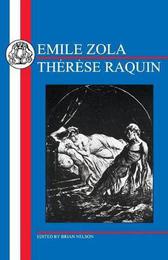
|
Zola: Therese Raquin
Paperback / softback
Main Details
| Title |
Zola: Therese Raquin
|
| Authors and Contributors |
By (author) Emile Zola
|
|
Volume editor Brian Nelson
|
| Series | French Texts |
|---|
| Physical Properties |
| Format:Paperback / softback | | Pages:224 | | Dimensions(mm): Height 216,Width 137 |
|
| Category/Genre | Literary essays
Literary studies - c 1800 to c 1900
Classic fiction (pre c 1945) |
|---|
| ISBN/Barcode |
9781853992872
|
| Classifications | Dewey:843.8 |
|---|
| Audience | | Undergraduate | | Postgraduate, Research & Scholarly | |
|---|
|
Publishing Details |
| Publisher |
Bloomsbury Publishing PLC
|
| Imprint |
Bristol Classical Press
|
| Publication Date |
1 January 1998 |
| Publication Country |
United Kingdom
|
Description
A gothic tale of murder and adultery, Therese Raquin was denounced as pornography on its publication in 1867. "Putrid literature" was how Louis Ulbach described the novel in a contemporary review. Zola defended himself against these attacks in his preface to the second edition, in which he outlined his aim to produce a new, "scientific" form of realism. The novel marks a crucial step in Zola's development and is a major early work of Naturalism. In his introduction to Therese Raquin, Brian Nelson places the novel in its cultural, intellectual and artistic contexts, and compares Zola's scientific aims with his actual practice in this work. The scientific status of Naturalist fiction remains problematic; in the final analysis it is influenced by literary models and conventions. Zola's powerful mythopoeic imagination does much to counteract the mechanistic view of humanity the novel was intended to embody. The myth of the fall is, indeed, fundamental to Zola's Naturalistic vision.
Author Biography
Brian Nelson is a professor of French Studies at Monash University, Melbourne and editor of the Australian Journal of French Studies. His publications include Zola and the Bourgeoisie and Emile Zola: A Selective and Analytical Bibliography, and a number of modern translations of Emile Zola for the Oxford World's Classics series.
ReviewsNovel by Emile Zola, first published serially as Un Mariage d'Amour in 1867 and published in book form with the present title in the same year. Believing that an author must simply establish his characters in their particular environment and then observe and record their actions as if conducting an experiment, Zola nonetheless adopted a highly moral, unscientific tone in this grisly novel, the first to put his "analytical method" into practice. The sensual Therese and her lover Laurent murder her weak husband Camille. After marrying, they are haunted by Camille's ghost, and their passion for each other turns to hatred. They eventually kill themselves. Conservative readers accused Zola of prurience; the novel, however, illustrates the author's belief that sexual pleasure leads only to brutality and destruction. * The Merriam-Webster Encyclopedia of Literature *
|